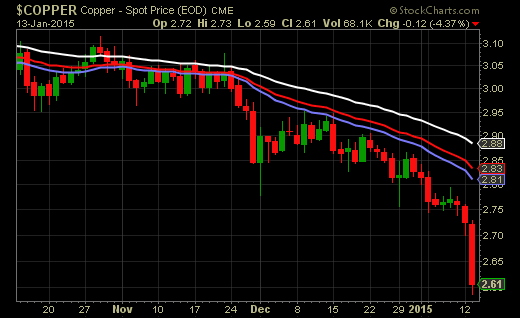Stock Market Today – A Very Important Week Ahead
Although nearly every week is replete with news, economic events and all manner of market-moving headlines, not all weeks are created equal.
This week is, in fact, the first really important macro-economic week of 2015, and while there aren’t a huge number of economic events, what we do have on tap is extremely important.
Obviously, the clear highlight this week is the European Central Bank (ECB) meeting on Thursday. We’ll be previewing the particulars of the meeting in the coming days, but given the Swiss National Bank (SNB) decision last week to de-peg the franc from the euro, it seems that expectations are high for something big from the ECB QE plan.
At this point, 500 billion euros remains a key level to watch. I suspect that anything below this level will be considering underwhelming.
Now, in addition to the ECB we also get the global January flash PMIs Wednesday night/Thursday morning. Given the concerns about global growth and global deflation, these metrics are very important, as the market needs a confidence boost about the pace of growth globally.
Specifically, China and Europe remain in focus, especially following the downbeat Chinese growth data Monday night and the ECB decision looming Thursday morning. And, for the first time in a few months, even the US data will be watched closely. On an absolute level it should be fine, but right now the key is just how much momentum the US manufacturing sector is losing.
If we see a sharp deceleration in US manufacturing data, it may weigh further on sentiment. Now, staying in the US, we also get the latest round of housing data via housing starts on Wednesday, and existing home sales on Friday. Keep in mind that housing has quietly lost a bit of positive momentum over the past two months, and some stabilization in that data will help provide a boost to market confidence.
For 2015, the global economy is estimated to expand by 3%, which is down from a projected 3.4% growth rate in June. In 2016, the World Bank thinks growth will come in at 3.3%, which is down from the prior estimate for 3.5% growth.
Bottom line: This week is key, because it is an opportunity for the ECB and economic data to help partially vanquish the growing concerns about the pace of global growth and disinflation. If the PMIs are decent (meaning China and Europe stay above 50), and the ECB does something powerful (i.e. QE greater than 500 billion), the outlook for the global economy could be a lot better as we head into Greek elections Sunday.

